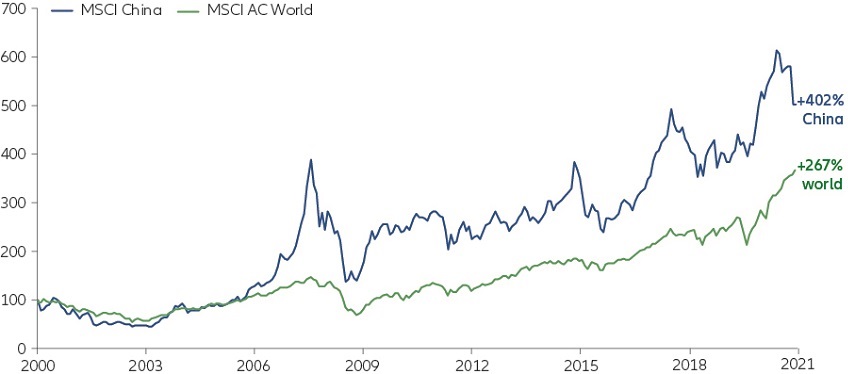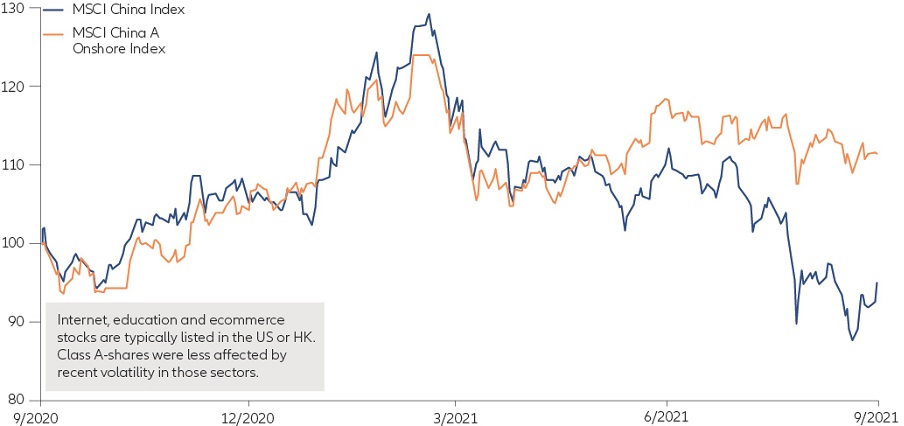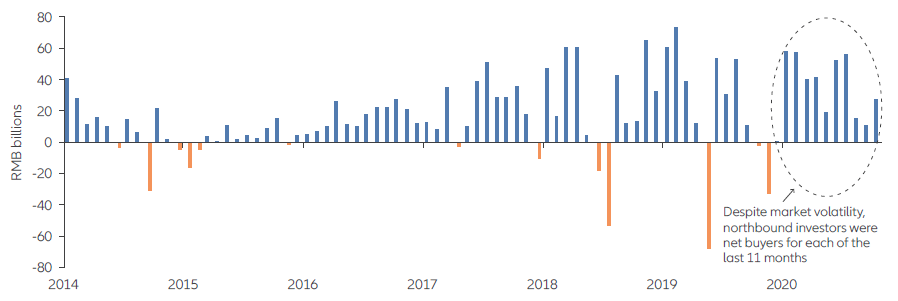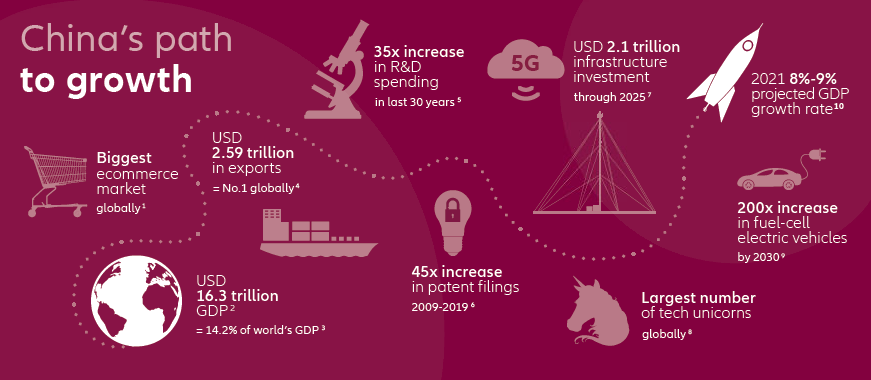7 reasons to stay invested in China equities

Summary
Although recent news out of China has understandably unsettled the markets, we don’t think it changes the long-term investment case. Volatility goes hand in hand with China’s higher long-term return potential. Understanding the dynamics at play can help make these changes easier to take in stride.
Investing in China brings different risks and greater unpredictability compared with Western markets. The Chinese government’s recent clampdown on tech firms and education companies illustrates this point. But investors have historically been rewarded with long-term outperformance. Indeed, an investment in the MSCI China Index from January 2000 to the end of August 2021 would have generated a 402% return. In the past, moments of volatility like this have proved to be buying opportunities for many long-term investors.
MSCI China and MSCI ACWI performance since 2000 (in USD, indexed to 100)

Source: Bloomberg, Allianz Global Investors. Data as at 31 August 2021. Based on total return performance in gross, in USD. Past performance is not indicative of future results.
There are many ways for investors to buy shares of Chinese companies. This has become even more important during China’s recent regulatory clampdown, which affected some listings – particularly US-listed American depositary receipts (ADRs) and select Hong Kong-listed companies – more than others. With China A-shares constituting almost 70% of China’s total market capitalisation size, China’s capital markets are much broader and deeper than many investors realise.
Major stock exchanges for China equities vs euro area

Source: Shenzhen Stock Exchange, Shanghai Stock Exchange, Hong Kong Stock Exchange, Bloomberg, Allianz Global Investors. Data as at 30 June 2021. The total figures are for comparison only. The stocks included may be listed in more than one exchange. Offshore China stocks are defined based on companies with ultimate parent domiciled in China. Suspended stocks, investment funds and unit trusts are excluded.
The regulatory clampdown on tech giants and education firms didn’t affect China A-shares as much as other listings. It’s another reasons for investors to explore the broad universe of Chinese equities – regardless of where the stocks are listed.
- Internet, education and ecommerce stocks tend to be better represented in Hong Kong-listed stocks and US-listed ADRs (American depositary receipts).
- A-shares (stocks of Chinese companies listed on exchanges in Shanghai or Shenzhen) tend to feature more companies in sectors such as industrials, healthcare and consumer goods.
MSCI China A Onshore Index vs MSCI China Index performance since September 2020 (in USD, indexed to 100)

Source: Bloomberg, Allianz Global Investors. Data as at 31 August 2021. Based on total return performance in gross, in USD. Past performance is not indicative of future results.
China’s equity markets are appreciated for their long-term potential for outperformance, but they’re also useful as a portfolio-diversification tool. China A-shares have a correlation of 0.32 with global equities over the last 10 years, which means they move in different directions almost 70% of the time. (In comparison, US and global equities have a correlation of 0.97.) Holding A-shares in a global portfolio may help generate a better risk-return profile.
Historical correlation between major equity markets since 2011

Source: Bloomberg, Allianz Global Investors. Data as at 31 August 2021. Correlation data is calculated based on historical return of respective MSCI indices for the past 10 years, using weekly USD return. China A-shares represented by MSCI China A Onshore Index; HK-listed China stocks by Hang Seng Chinese Enterprises Index; APxJ equities by MSCI AC Asia ex Japan Index; global emerging market equities by MSCI Emerging Markets Index; Japan equities by TOPIX Index; US equities by S&P 500 Index; European equities by MSCI Europe Index; world equities by MSCI World Index. Past performance is not indicative of future performance.
Despite the negative news out of China, global investors have continued to add China A-shares to their portfolios. August 2021 marked the ninth consecutive month of positive flows for this share class, suggesting a “buy the dip” mentality. The Chinese government recently helped lay the groundwork for greater cross-border investment with the launch of the Shanghai and Shenzhen Stock Connect schemes in 2014 and 2016, respectively:
- In “southbound” trades, mainland China residents use the Shanghai or Shenzhen exchanges to buy Hong Kong-listed stocks.
- Investors outside of mainland China can use the Hong Kong exchange to buy A-shares in Shanghai or Shenzhen (known as a “northbound” trade).
Monthly northbound net buying via Stock Connect since 2014 (in RMB)

Source: Wind, Allianz Global Investors. Data as at 31 August 2021.
In a sign of China’s growing integration into global financial markets, major stock indices have been adding more Chinese stocks – reflecting the increasing importance of China to the global financial system. But China’s representation in these indices still underplays the country’s significant economic potential. Investors may want to consider allocating more to China than benchmarks do.
Key statistics on China and China equities

Source: FactSet, MSCI, Goldman Sachs Global Investment Research. Data as at 31 December 2020.
China has come a long way in a short time. Once known as the “factory of the world”, it shifted away from low-cost manufacturing towards the high-tech areas that are essential to its growth – and, crucially, its desire for self-sufficiency. A rapidly expanding middle class, increasing domestic consumption, high-tech innovation and a commitment to a carbon-free economy are all key parts of the China growth story.

Source for stats in “China’s path to growth” infographic
1. Source: eMarketer. Data as at 2020.
2. Source: World Bank. Data as at 2019.
3. Source: World Bank. Data as at 2019.
4. Source: World's Top Exports. Data as at 2019.
5. Source: OECD, Allianz Global Investors. Data as at 2018.
6. Source: World Intellectual Property Organization. Data as at December 2019.
7. Source: Goldman Sachs. Data as at July 2020.
8. Source: Hurun Research Institute, Nikkei Asia review. Data as at 2019.
9. Source: Belfer Center for Science & International Affairs.
10. Source: IMF. Data as at 2021.
MSCI AC Asia ex Japan Index is an unmanaged index that captures large- and mid-cap representation across two developed-market countries (excluding Japan) and nine emerging-market countries in Asia. MSCI All Country World Index (ACWI) is an unmanaged index designed to represent performance of large- and mid-cap stocks across 23 developed and 24 emerging markets. MSCI China A Onshore Index is an unmanaged index that captures large- and mid-cap representation across China securities listed on the Shanghai and Shenzhen exchanges. MSCI China Index is an unmanaged index that captures large- and mid-cap representation across approximately 85% of the China equity universe. MSCI Emerging Markets Index is an unmanaged index that captures large- and mid-cap representation across 27 emerging-market countries. MSCI Europe Index is an unmanaged index that represents the performance of large and mid-cap equities across 15 developed countries in Europe. MSCI World Index is an unmanaged index that captures large- and mid-cap representation across 23 developed-market countries. Hang Seng Chinese Enterprises Index is an unmanaged, market capitalisation-weighted index tracks the performance of major H-shares (stocks traded on the Hong Kong exchange). Standard & Poor’s 500 Composite Index (S&P 500) is an unmanaged index that is generally representative of the US stock market. TOPIX Index is an unmanaged, market capitalization-weighted index of all companies listed on the First Section of the Tokyo Stock Exchange. Investors cannot invest directly in an index.
Investing involves risk. The value of an investment and the income from it will fluctuate and investors may not get back the principal invested. Emerging markets may be more volatile, less liquid, less transparent, and subject to less oversight, and values may fluctuate with currency exchange rates. Past performance is not indicative of future performance. This is a marketing communication. It is for informational purposes only. This document does not constitute investment advice or a recommendation to buy, sell or hold any security and shall not be deemed an offer to sell or a solicitation of an offer to buy any security.
The views and opinions expressed herein, which are subject to change without notice, are those of the issuer or its affiliated companies at the time of publication. Certain data used are derived from various sources believed to be reliable, but the accuracy or completeness of the data is not guaranteed and no liability is assumed for any direct or consequential losses arising from their use. The duplication, publication, extraction or transmission of the contents, irrespective of the form, is not permitted.
This material has not been reviewed by any regulatory authorities. In mainland China, it is used only as supporting material to the offshore investment products offered by commercial banks under the Qualified Domestic Institutional Investors scheme pursuant to applicable rules and regulations. This document does not constitute a public offer by virtue of Act Number 26.831 of the Argentine Republic and General Resolution No. 622/2013 of the NSC. This communication’s sole purpose is to inform and does not under any circumstance constitute promotion or publicity of Allianz Global Investors products and/or services in Colombia or to Colombian residents pursuant to part 4 of Decree 2555 of 2010. This communication does not in any way aim to directly or indirectly initiate the purchase of a product or the provision of a service offered by Allianz Global Investors. Via reception of his document, each resident in Colombia acknowledges and accepts to have contacted Allianz Global Investors via their own initiative and that the communication under no circumstances does not arise from any promotional or marketing activities carried out by Allianz Global Investors. Colombian residents accept that accessing any type of social network page of Allianz Global Investors is done under their own responsibility and initiative and are aware that they may access specific information on the products and services of Allianz Global Investors. This communication is strictly private and confidential and may not be reproduced. This communication does not constitute a public offer of securities in Colombia pursuant to the public offer regulation set forth in Decree 2555 of 2010. This communication and the information provided herein should not be considered a solicitation or an offer by Allianz Global Investors or its affiliates to provide any financial products in Brazil, Panama, Peru, and Uruguay. In Australia, this material is presented by Allianz Global Investors Asia Pacific Limited (“AllianzGI AP”) and is intended for the use of investment consultants and other institutional/professional investors only, and is not directed to the public or individual retail investors. AllianzGI AP is not licensed to provide financial services to retail clients in Australia. AllianzGI AP (Australian Registered Body Number 160 464 200) is exempt from the requirement to hold an Australian Foreign Financial Service License under the Corporations Act 2001 (Cth) pursuant to ASIC Class Order (CO 03/1103) with respect to the provision of financial services to wholesale clients only. AllianzGI AP is licensed and regulated by Hong Kong Securities and Futures Commission under Hong Kong laws, which differ from Australian laws.
This document is being distributed by the following Allianz Global Investors companies: Allianz Global Investors U.S. LLC, an investment adviser registered with the U.S. Securities and Exchange Commission; Allianz Global Investors Distributors LLC, distributor registered with FINRA, is affiliated with Allianz Global Investors U.S. LLC; Allianz Global Investors GmbH, an investment company in Germany, authorized by the German Bundesanstalt für Finanzdienstleistungsaufsicht (BaFin); Allianz Global Investors (Schweiz) AG; Allianz Global Investors Asia Pacific Ltd., licensed by the Hong Kong Securities and Futures Commission; Allianz Global Investors Singapore Ltd., regulated by the Monetary Authority of Singapore [Company Registration No. 199907169Z]; Allianz Global Investors Japan Co., Ltd., registered in Japan as a Financial Instruments Business Operator [Registered No. The Director of Kanto Local Finance Bureau (Financial Instruments Business Operator), No. 424, Member of Japan Investment Advisers Association and Investment Trust Association, Japan]; and Allianz Global Investors Taiwan Ltd., licensed by Financial Supervisory Commission in Taiwan.
1818039
China’s Phase 3: a new chapter in its epic story

Summary
To understand current developments in China, it’s important to see how the country is now emphasising not just economic power, but the “soft” power of persuasion and influence. The key for investors is to learn how and where these strategic priorities will translate into opportunities.
Key takeaways
|






